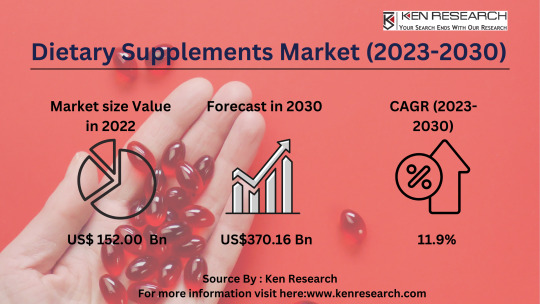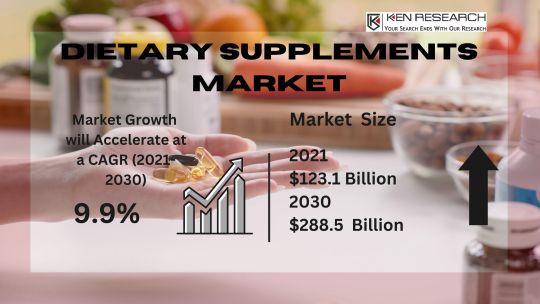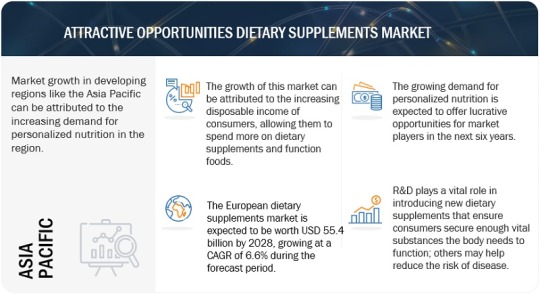#Dietary Supplements Market Trends
Text
Dietary Supplements Market Segmentation: Product Types and Applications
Dietary Supplements: Understanding the Options
Dietary supplements have become increasingly popular in recent years as more individuals look to enhance their nutrition with additional vitamins, minerals and other substances. However, with so many options available, it can be difficult to determine which supplements may provide benefit as well as potential risks and side effects. In this article, we explore the different types of dietary supplements and provide guidance on safely choosing and using these products.
What are Dietary Supplements?
A dietary supplement is defined as a product intended to supplement the diet that contains one or more dietary ingredients like vitamins, minerals, herbs or other botanicals, amino acids and substances found in the human body like enzymes, organ tissues and metabolites. The dietary ingredients in these products may provide health benefits in addition to the nutrients that can be obtained from food. Some common types of dietary supplements include multivitamins, calcium and vitamin D supplements, probiotic supplements, fish oil supplements and herbal supplements like ginseng and ginkgo biloba.
Regulation of Dietary Supplements
Unlike pharmaceutical drugs, dietary supplements are regulated as foods rather than medications in the United States and their manufacturers do not need to prove safety or effectiveness to the FDA before selling their products. Under DSHEA (Dietary Supplement Health and Education Act) passed in 1994, supplement companies are responsible for ensuring the safety of their products and labeling them properly. However, serious adverse events or product quality issues with dietary supplements may go unreported and the FDA has limited resources for monitoring the safety of ingredients in supplements after they are marketed.
Benefits and Risks of Common Dietary Supplements
Multivitamins- For individuals with inadequate nutrition from food alone, a daily multivitamin supplement can help fill potential gaps. However, most healthy individuals do not need additional vitamins and minerals except for vitamin D and omega-3 fatty acids in some cases. Excess intake of certain vitamins like vitamin A, D, E and zinc can potentially lead to adverse effects over time.
Probiotics- Probiotic supplements containing beneficial bacteria like Lactobacillus and Bifidobacterium species may help improve digestive health when taken regularly. Side effects are typically mild like gas and bloating in some individuals. People with severe medical conditions should consult their doctor before use.
Fish Oils - Omega-3 fatty acids EPA and DHA found abundantly in fish oils have been linked to heart health benefits when consumed as part of a healthy diet. Supplementing may help boost low levels. Risks include burping and mild indigestion at high doses. People on blood thinners should be cautious about herb and supplement interactions.
0 notes
Text
Future Nutrition: Insights into Trends Shaping Dietary Supplements (2023-2030)

Gain insights into the future of nutrition with trends shaping dietary supplements (2023-2030). Explore forecasts, industry opportunities, and trends in the vitamins and dietary supplement market for a holistic perspective.
#Nutritional and Dietary Supplements Market#Dietary Supplements Market#Nutritional Supplements Market#Dietary Supplements Sector#Health Supplements Market#Dietary Supplements Market Analysis#Nutritional Supplements Market Size#growth of Nutritional Supplements industry#Top Players in Dietary Supplements Market#Dietary Supplements Market Forecast#Dietary Supplements Market Trends#Opportunities in Dietary Supplements Industry
0 notes
Text
Dietary Supplements Industry Overview, Trends, Growth Drivers, and Opportunities
The global dietary supplements market is projected to grow from USD 167.5 billion in 2023 to USD 239.4 billion in 2028, at a CAGR of 7.4% during the forecast period. The factors driving the growth are the increasing elderly population, the shift from pharmaceuticals towards nutraceuticals, amino acids, and protein supplements due to the focus on preventive healthcare, and the growing personalized nutrition, which is supporting the dietary supplement industry. Consumers are shifting focus toward self-directed care driven by the growing personal health, weight management, and well-being trend. The personal care markets have changed drastically in recent years, from consumers adopting weight management and protein supplements to help manage lifestyle disorders. In most of the region, it is seen that people do not take an adequate amount of protein, and because of this, the need for amino acids and protein supplements is increasing. Additionally, due to wrong eating habits and improper lifestyles, a vast majority of consumers are opting for weight management supplements to curb obesity and overweight issues.
Dietary Supplements Market Share
Key players in this market include Nestle (Switzerland), Abbott (US), Amway Corp (US), Pfizer Inc. (US), ADM (US), International Flavors Fragrance (US), Otsuka Holdings Co., Ltd (Japan), Glanbia PLC (Ireland), GSK PLC. (UK), Bayer AG (Germany), Herbalife International of America, Inc. (US), Nature's Sunshine Products, Inc (US), Bionova (Canada), ArkoPharma (France), American Health (US), Pure Encapsulation (US), HH Group (Hong Kong), Nu Skin (US), Power Gummies (India), Biomedical Research Laboratories (US), HealthKart (India), NutriScience Corporation (US), Nature's Essentials (US), and Life Extension (US).
Dietary Supplements Market Trends
Growing Consumer Awareness and Focus on Health: There has been an increasing awareness among consumers about the importance of maintaining good health and preventing health issues. This awareness has translated into a growing demand for dietary supplements as people seek convenient ways to complement their diets and address specific health concerns.
Preventive Healthcare and Wellness: Many consumers are shifting their focus from treating illnesses to preventing them. This has led to a rise in the consumption of dietary supplements that claim to support overall wellness, boost immunity, and promote longevity.
Plant-Based and Natural Ingredients: There has been a noticeable trend towards plant-based and natural ingredients in dietary supplements. Consumers are seeking products that align with their preferences for clean labels, sustainability, and a perceived connection to nature.
Personalization and Customization: The one-size-fits-all approach is giving way to personalized and customized solutions. Companies are increasingly offering tailored supplements based on individual health needs, genetic factors, and lifestyle choices.
E-commerce and Direct-to-Consumer Sales: The rise of e-commerce has significantly impacted the distribution of dietary supplements. Many consumers prefer the convenience of online shopping, and this trend is expected to continue. Additionally, some brands have adopted direct-to-consumer models, bypassing traditional retail channels.The sports nutrition function segment is projected to grow at the highest rate during the forecast period.
Many sports nutrition supplements available today include multivitamins, branched-chain amino acids (leucine), omega-3 fatty acids, glucosamine, glutamine, beta-alanine, beetroot, and green tea extract, each of which provides different performance benefits. In general, all humans require an adequate amount of macro and micronutrients. However, due to extreme exertion athletes need to monitor their food intake. Sports nutrition supplements provide them with all the required nutrients, which is why this category is projected to grow fastly in the dietary supplements market.
Download PDF Brochure:
https://www.marketsandmarkets.com/pdfdownloadNew.asp?id=973
North America holds the highest market share during the forecast period.
North American nutrition and supplements hold the largest market share and are expected to expand further. The North American population has become more aware of health and has adopted dietary supplements as a part of their daily diet regime to have overall health and weight benefits. The population in the region is more prone to lifestyle disorders like diabetes, obesity, and high blood pressure, due to improper diet. The region is more inclined towards consuming junk and processed food that are devoid of nutrition, which gives rise to health disorders. Additionally, the trend of consuming vegan and less processed food is leading to the increased intake of dietary supplements to tackle nutritional deficiencies. Additionally, South Africa seems to be a potential market in terms of production and consumption of dietary supplements. The general trend of malnourishment and other nutritional deficiencies is seen in the population in the South African region. Together, it drives the overall dietary supplements market.
#Dietary Supplements Market#Dietary Supplements Market Size#Dietary Supplements Market Share#Dietary Supplements Market Growth#Dietary Supplements Market Trends#Dietary Supplements Market Forecast#Dietary Supplements Market Analysis#Dietary Supplements Market Report#Dietary Supplements Market Scope#Dietary Supplements Market Overview#Dietary Supplements Market Outlook#Dietary Supplements Market Drivers#Dietary Supplements Industry
0 notes
Text
The Best Multivitamin Ingredients for Immune Protection and Good Health
#Prior to the onset of the Covid-19 crisis#consumers had already grown increasingly mindful of the impact of nutrition on their health. The pandemic has turbo-charged this trend#as protection from infection and illness has rapidly become a year-round concern rather than a seasonal one. As a result#the 2020 global dietary supplements market size of USD 140.3 billion was projected to expand at a compound annual growth rate (CAGR) of 8.6#according to a report by Grand View Research.
0 notes
Text
Saudi Arabia Dietary Supplements Market Size, Share, Price, Trends, Growth, Analysis, Report and Forecast 2024-2032

The Saudi Arabia dietary supplements market size was valued at USD 289.8 million in 2023, driven by increasing prevalence lifestyle disorders due to urbanisation and sedentary lifestyle across the globe. The market size is anticipated to grow at a CAGR of 9.6% during the forecast period of 2024-2032 to achieve a value of USD 658.9 million by 2032.
Saudi Arabia Dietary Supplements Market: Competitor Landscape
Bayer Saudi Arabia, LLC
• Procter & Gamble Company (Abudawood Group)
• Abbott Saudi Arabia Trading LLC
• Pfizer Saudi Limited
• Nestlé S.A. (Al Muhaidib Group)
• Applied Nutrition Ltd. (AmCan International Group, Inc)
Read Full Report with Table of Contents – https://www.expertmarketresearch.com/reports/saudi-arabia-dietary-supplements-market
#Saudi Arabia Dietary Supplements Market Size#Saudi Arabia Dietary Supplements Market Share#Saudi Arabia Dietary Supplements Market Growth#Saudi Arabia Dietary Supplements Market Trends#Saudi Arabia Dietary Supplements Market
0 notes
Text
Ketones Market and its Transformative Influence on Multiple Sectors
The global ketones market size is anticipated to reach USD 30.25 billion by 2030, according to a new report by Grand View Research, Inc., expanding at a CAGR of 3.8% from 2023 to 2030. The market is driven by the growing awareness regarding keto diets in dietary supplements, food and beverage, and personal care and cosmetics across the globe.

Ketones Market Report Highlights
The dietary supplements application segment is expected to register the fastest CAGR over the forecast period. This is attributed to the rising consumption of the keto diet among health enthusiasts and rising awareness regarding ketones in dietary supplements
The ketone salts segment is expected to expand at the fastest revenue-based CAGR of 4.3% over the forecast period owing to the capability of these salts to increase ketone levels in blood without a keto diet just like ketosis and provide energy
Ketone oil held the largest revenue share of over 53.6% in 2022. This is attributed to its antioxidant, anti-microbial, and anti-inflammatory capabilities. Moreover, it is used as a carrier for active ingredients and viscosity regulator and as an emollient in cosmetics and personal care products
Europe is expected to expand at the fastest revenue-based CAGR of 4.3% over the forecast period owing to the production of customized cosmetics and personal care products and growing consumer awareness regarding the use of natural ingredients
Key companies are involved in rapid research and development and they dominate the global market with their extensive presence throughout the value chain
For More Details or Sample Copy please visit link @: Ketones Market Report
The growing interest in weight management and healthy lifestyles among the general public and the increasing demand for ketone supplements are a few of the main factors fueling market revenue growth. Along with it, the rising use of natural ingredients is also a major factor facilitating market growth.
Chronic diseases such as cancer, cardiovascular problems, diabetes, and obesity are becoming more common due to lifestyle modifications and poor eating practices. One of the main causes of death is obesity as those who are obese are more likely to contract numerous illnesses and health problems. People all around the world are focusing on modifying their food habits and moving toward healthy lifestyles to maintain healthy living. The demand for the product is rising as a result of factors such as rising convenience food consumption, rising disposable income, and rising adoption of healthier lifestyles. To meet growing consumer demand, a number of large companies are manufacturing improved products.
The dietary supplements application segment accounted for the largest revenue share in 2021. Higher prevalence of various chronic diseases, knowledge of the advantages of ketone supplements, weight loss, rising interest in leading healthy lifestyles, and rising use of these supplements among athletes and sportspeople are some of the factors contributing to this segment growth.
Keto #KetonesMarket #KetogenicTrends #HealthAndWellness #NutritionalSupplements #KetoDiet #SportsNutrition #MetabolicHealth #InnovationsInHealth #MarketAnalysis #Biohacking #FunctionalFoods #DietarySupplements #GlobalHealthTrends #WellnessIndustry #KetogenicLifestyle #IndustryInsights #FutureofNutrition #HealthTech #MarketResearch
#Keto#Ketones Market#Ketogenic Trends#Health And Wellness#Nutritional Supplements#Keto Diet#Sports Nutrition#Metabolic Health#Innovations In Health#Biohacking#Functional Foods#Dietary Supplements#Global Health Trends#Wellness Industry#Ketogenic Lifestyle#Future of Nutrition#Health Tech#Market Research
0 notes
Link
0 notes
Text
Exploring the Thriving Omega-3 Products Market

In the realm of health and wellness, the Omega-3 products market has carved out a significant niche for itself. These essential fatty acids, commonly found in fish, flaxseeds, and walnuts, have garnered attention for their potential health benefits. With the growing interest in preventive healthcare, the Omega-3 products market is experiencing a remarkable surge in popularity.
Omega-3 fatty acids are renowned for their role in supporting heart health, cognitive function, and even reducing inflammation. This natural treasure trove of benefits has spurred a flourishing market for Omega-3 products, ranging from supplements to functional foods. These products offer consumers a convenient way to incorporate these vital nutrients into their diets, especially for those who may not consume fish regularly.
One key driver behind the Omega-3 Products Market growth is the increasing consumer awareness of the importance of a balanced diet and proactive health management. As people become more health-conscious, they are seeking dietary solutions that align with their wellness goals. This shift has led to a surge in demand for Omega-3 supplements, capsules, and fortified foods that provide a quick and easy means of obtaining these essential fatty acids.
The market has responded with a diverse array of Omega-3 products, catering to various preferences and dietary requirements. From vegan-friendly supplements sourced from algae to premium fish oil capsules, consumers now have an assortment of choices to suit their needs. Additionally, the expansion of e-commerce platforms has made these products more accessible than ever before, allowing consumers to research and purchase products with ease.
However, like any booming market, the Omega-3 Products Market is not without its challenges. Quality control, transparency, and accurate labeling are critical considerations. Consumers are increasingly vigilant about product authenticity and efficacy, driving manufacturers to uphold high standards and engage in transparent practices.
In conclusion, the Omega-3 products market is an exciting and dynamic landscape that mirrors the growing focus on health-conscious living. As scientific research continues to unveil the potential benefits of Omega-3 fatty acids, the market is poised to evolve further. For consumers, the expanding variety of Omega-3 products offers an opportunity to embrace wellness in a convenient and personalized manner. As this market continues to flourish, it's important for both consumers and manufacturers to collaborate in ensuring the credibility and efficacy of these products.
#Omega-3 Products Market#health-conscious consumers#omega-3 fatty acids#nutritional supplements#functional foods#algal oil supplements#cardiovascular health#cognitive function#personalized nutrition#consumer awareness#health trends#research advancements#wellness solutions#dietary supplements#market diversification
0 notes
Link
Rampant increase in lifestyle diseases and changing mindset toward preventive healthcare worldwide drive the global dietary supplements market. Leading...
0 notes
Text
Dietary Supplements Market Landscape: Regional Perspectives and Market Segmentation

Dietary supplements are products intended to supplement the diet that contain one or more dietary ingredients such as vitamins, minerals, herbs, amino acids, or other botanicals. The dietary supplement industry has witnessed significant growth over the past few years due to the increasing focus of consumers on preventive healthcare and maintenance of general wellbeing. Dietary supplements help fulfill the nutritional gaps in regular diets and support active, healthy lifestyles. The product categories within the dietary supplements segment comprise of vitamins, minerals, botanicals, proteins, fatty acids, and others.
The global Dietary Supplements Market is estimated to be valued at US$ 203.43 billion in 2023 and is expected to exhibit a CAGR of 8.2% over the forecast period 2024 to 2031, as highlighted in a new report published by Coherent Market Insights.
Market Opportunity:
The growing prevalence of lifestyle diseases and chronic health conditions represents a key market opportunity for players in the dietary supplements market. According to the Centers for Disease Control and Prevention, over half of the adult population in the United States currently suffers from at least one chronic disease such as diabetes, heart disease, and obesity. Dietary supplements can potentially help in management and prevention of these conditions by fulfilling nutritional deficiencies. They offer natural alternatives to medications with generally lower risks or side effects. The increasing consumer awareness about preventive healthcare approaches and proactive management of general wellbeing through balanced diets and active lifestyles will continue to drive demand for dietary supplements over the forecast period.
Porter’s Analysis
Threat of new entrants: The dietary supplements market has moderate threat of new entrants due to product differentiation, existing intellectual property protection and patents held by major players. However, ease of manufacturing may encourage new players with innovative offerings.
Bargaining power of buyers: Buyers have moderate bargaining power due to variety of options and substitute products available in the market. Switching costs are low.
Bargaining power of suppliers: Key raw material suppliers like vitamins and minerals manufacturers have moderate bargaining power due to specialized ingredients required and switching costs.
Threat of new substitutes: Threat from new substitutes is moderate as substitute options include prescription drugs, organic foods and functional beverages. Product innovation is a key differentiator.
Competitive rivalry: The market has high competitive rivalry due to presence of global established brands with diverse product portfolios. Pricing pressure exists due to competition.
SWOT Analysis
Strength: Wide range of products, extensive distribution channels, strong brand recognition and marketing campaigns by major established players.
Weakness: High R&D investment required, regulatory compliance and quality certifications costs. Vulnerability to adverse publicity on any health claims.
Opportunity: Rising health awareness, growing geriatric population, increased income levels in developing nations boosting demand.
Threats: Stringent regulations. Shift towards preventive healthcare and healthy lifestyle changes decrease dependence on supplements.
Key Takeaways
The global Dietary Supplements Market is expected to witness high growth during the forecast period from 2024 to 2031. The global Dietary Supplements Market is estimated to be valued at US$ 203.43 billion in 2023 and is expected to exhibit a CAGR of 8.2% over the forecast period 2024 to 2031.
North America currently dominates the market due to heightened health awareness and discretionary spending on wellness products. The market in Asia Pacific is expected to grow the fastest during the forecast period supported by rising middle class population, increased lifestyle diseases and growing acceptability of dietary habits from western countries. North America currently accounts for the largest share of over 35% of the global dietary supplements market supported by early adoption of supplements as preventive healthcare and availability of diverse products. The Asia Pacific region is expected to grow at the fastest CAGR during the forecast period backed by nutrition awareness, lifestyle changes and escalating per capita income in populous developing countries like India and China. Expansion of modern retail outlets and e-commerce boost access to supplements in the region.
Key players operating in the dietary supplements market are Abbott Laboratories, Amway (Nutrilite), DuPont, NBTY Inc., Royal DSM N.V., Glanbia Plc., Bayer AG, GlaxoSmithKline PLC., Herbalife International, and BASF SE. These established players have strong global presence and brand recognition leveraged by extensive marketing activities. Abbott Laboratories leads the US market, while Herbalife International dominates Latin America. Glanbia has a stronghold in Europe through its acquisition strategy.
0 notes
Text
Beyond Vitamins: Unveiling Innovations in the Dietary Supplements Realm

Unveil innovations in the dietary supplements realm, exploring the future outlook, trends, segmentation, and key players shaping the dynamic landscape of the dietary supplements industry.
#Nutritional and Dietary Supplements Market#Dietary Supplements Market#Health Supplements Market#Top Players in Dietary Supplements Market#Dietary Supplements Market Future Outlook#Dietary Supplements Market Trends#Dietary Supplements Market Segmentation#Dietary Supplements Sector#Dietary Supplements Market Forecast
0 notes
Text

The global dietary supplements market is projected to grow from USD 167.5 billion in 2023 to USD 239.4 billion in 2028, at a CAGR of 7.4% during the forecast period.
#Dietary Supplements Market#Dietary Supplements#Dietary Supplements Market Size#Dietary Supplements Market Share#Dietary Supplements Market Growth#Dietary Supplements Market Trends#Dietary Supplements Market Forecast#Dietary Supplements Market Analysis#Dietary Supplements Market Research Report
0 notes
Text
Global Dietary Supplement Market | Pharmaceuticals Industry
Global Market for Dietary Supplements would witness a CAGR of 8.91% and is predicted to generate a revenue of approximately $306.12 million by 2028.
Read More:
#dietary supplement market#dietary supplement#pharmaceuticals industry#dietary supplement analysis#triton market research#market research reports#market research trends
0 notes
Text
#Dietary Supplements Market#Dietary Supplements Market scope#Dietary Supplements Market size#Dietary Supplements Marketshare#Dietary Supplements Market trend#Dietary Supplements Market analysis
0 notes
Link
The global dietary supplements market size shall reach at USD 188.32 billion in 2025 and expected to expand at a CAGR of 7.8% from 2019 to 2025.
0 notes
Text
Dietary Supplements Market
View more @ https://bit.ly/3BmT8W0
Dietary Supplements Market size is estimated to reach $239.2 billion by 2027, growing at a CAGR of 8.5% during the forecast period 2022-2027.
0 notes